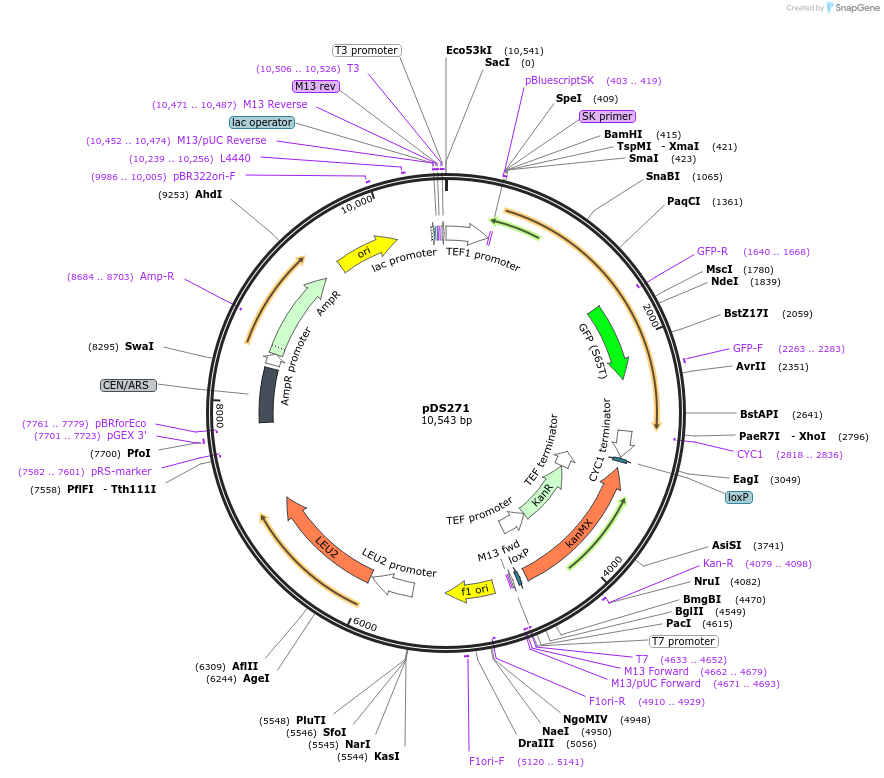pDS271
(Plasmid
#34974)
-
Depositing Lab
-
Sequence Information
Ordering
| Item | Catalog # | Description | Quantity | Price (USD) | |
|---|---|---|---|---|---|
| Plasmid | 34974 | Standard format: Plasmid sent in bacteria as agar stab | 1 | $89 | |
Backbone
-
Vector backbonepGREG505
-
Backbone manufacturerEUROSCARF
- Backbone size w/o insert (bp) 7747
-
Modifications to backbonePTEF-Mid2-GFP-LOVpep-TCYC1 cassette inserted into pGREG505
-
Vector typeYeast Expression
-
Selectable markersLEU2 ; KanMX
Growth in Bacteria
-
Bacterial Resistance(s)Ampicillin, 100 μg/mL
-
Growth Temperature37°C
-
Growth Strain(s)DH5alpha
-
Copy numberHigh Copy
Gene/Insert
-
Gene/Insert nameMid2-GFP-LOVpep
-
SpeciesS. cerevisiae (budding yeast); A. sativa
-
Insert Size (bp)2796
-
MutationT406A, T407A, V416I
-
Entrez GeneMID2 (a.k.a. YLR332W, KAI1)
- Promoter TEF
Cloning Information
- Cloning method Restriction Enzyme
- 5′ cloning site SacI (not destroyed)
- 3′ cloning site XhoI (not destroyed)
- 5′ sequencing primer M13 rev
- 3′ sequencing primer M13 fwd
- (Common Sequencing Primers)
Resource Information
-
Supplemental Documents
-
A portion of this plasmid was derived from a plasmid made byGFP(S65T) CDS and other sequences from pGREG plasmids (EUROSCARF). A. sativa LOV2 CDS from Kevin Gardner, UT Southwestern Medical Center
Terms and Licenses
-
Academic/Nonprofit Terms
-
Industry Terms
- Not Available to Industry
Trademarks:
- Zeocin® is an InvivoGen trademark.
Depositor Comments
The LOV2 domain is amino acids 404-540 and differs from the wild-type A. sativa LOV2 sequence by the point mutations G528A and N534E. See Strickland et al. for details.
These plasmids were created by your colleagues. Please acknowledge the Principal Investigator, cite the article in which the plasmids were described, and include Addgene in the Materials and Methods of your future publications.
-
For your Materials & Methods section:
pDS271 was a gift from Michael Glotzer (Addgene plasmid # 34974 ; http://n2t.net/addgene:34974 ; RRID:Addgene_34974) -
For your References section:
TULIPs: tunable, light-controlled interacting protein tags for cell biology. Strickland D, Lin Y, Wagner E, Hope CM, Zayner J, Antoniou C, Sosnick TR, Weiss EL, Glotzer M. Nat Methods. 2012 Mar 4. doi: 10.1038/nmeth.1904. 10.1038/nmeth.1904 PubMed 22388287







